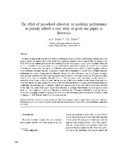The effect of pre-school education on academic performance in primary school: a case study of grade one pupils in Botswana

View/
Date
2002-01-08Author
Taiwo, A.A.
Tyolo, J.B.
Publisher
Elsevier, http://www.elsevier.com/wps/find/homepage.cws_homeLink
http://www.sciencedirect.com/science/article/B6VD7-44W2PR8-6/2/bd78dddfaf6c03655c219c1400b41f16Type
Published ArticleMetadata
Show full item recordAbstract
Evidence abounds in the literature of a direct link between pre-primary education and academic performance in the primary school. The salutary effect of the ‘Head start’ programme inaugurated in the United States of America in the early 1960s on the academic performances of its beneficiaries in the lower primary is such a piece of evidence. Premised on this commonality between pre-primary education and academic achievement in the primary school, the study aimed at finding out whether there were significant differences in the performances of Botswana grade one pupils with preschool education experience and their counterparts without such an experience on selected tasks in English language, mathematics and science. Using purposive sampling technique for school selection, a total of 120 grade one pupils were randomly selected for the study from four selected primary schools in Botswana. In addition, 20 grade one teachers from the study schools participated in the study. For data collection purpose, each pupil-subject was individually interviewed for about 20 min on the study tasks; and the opinions of the twenty teachers on the subject of the study was sampled by the use of a questionnaire. The results of the study indicated that pupils with pre-school education experience significantly out-performed their counterparts without such experience in all the three school subject areas surveyed by the study. This trend of the impact of pre-school education on academic achievement at the early primary school level was corroborated by the opinions of the primary school teachers. The paper concluded by observing that preschool education equips children with pre-requisite skills which make learning in grade one easier and faster for children so exposed.
Collections
Related items
Showing items related by title, author, creator and subject.
-
Botswana secondary school students' attitudes towards the use of Setswana as a medium of instruction in secondary schools
Laba, Tshepego (2016-07-15)This work reports the findings of a study which its objective was to investigate the student’s attitudes towards the use of Setswana as a medium of instruction at secondary school level, it was also meant to determine the ... -
In-school psychosocial counseling support for orphans in Gaborone west junior secondary schools
Molefe, Rosinah K. (2015-06-08)The purpose of this study was to examine the in-school psychosocial counseling support services for orphans in secondary schools. The objectives of the study was to determine the extent to which orphans are offered ... -
Implementation strategies of guidance & counselling programme in schools: a case study of Molepolole junior secondary schools
Keabona, M.B. (2015-05-29)Many schools in Botswana have reported a high level of indiscipline amongst the students. This is despite the existence of the Guidance and counselling programme in such schools. The study investigated strategies employed ...
